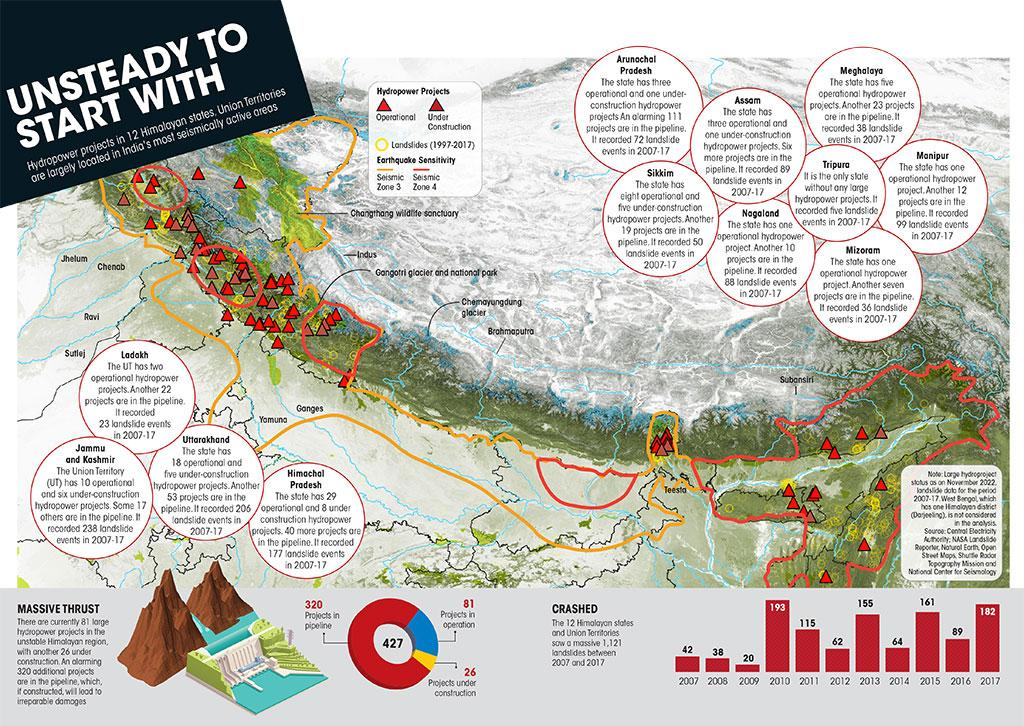Impacts of Hydropower Projects in the Himalayan Region | 05 Apr 2023
For Prelims: Central Electricity Authority, Landslides, Earthquake, National Mission on Sustaining Himalayan Ecosystem, National Action Plan on Climate Change
For Mains: Impact of hydro power projects in Himalaya Region
Why in News?
Disasters linked to hydropower projects in the Himalayan region have become more frequent in recent years.
What is the Potential of Hydropower Projects in Himalayan Region?
- With its abundant waterbodies and ideal topography to utilize the resource for electricity generation, the Himalayan region is regarded as the powerhouse of India.
- Government estimates suggest that the region has a potential to generate 115,550 MW with its installed capacity of 46,850 MW.
- Till November 2022, the 10 states and two Union territories in the region had 81 large hydropower projects (above 25 MW) and 26 projects under construction.
- Another 320 large projects are in the pipeline, according to the Central Electricity Authority under the Union Ministry of Power.
What are the Risks and Impacts of Hydropower Projects in the Himalayan Region?
- Vulnerability:
- The Himalayas are part of a seismically active zone.
- Despite the climate and seismic activities in the Himalayas making its river valleys prone to landslides, hydropower projects are mushrooming in the region. In Uttarakhand’s Joshimath town, where more than 800 buildings have developed cracks due to subsidence, the government on January 5, 2023, imposed a ban on construction activities, including on the works at Tapovan Vishnugad hydropower project.
- Impact:
- Hydropower projects in the region have become more frequent in recent years, and disasters linked to these projects have increased.
- In 2012, flooding in the Assi Ganga river damaged the Assi Ganga hydroelectric projects (HEP) 1 and 2.
- The 2013 Kedarnath floods severely damaged Phata-Byung, Singoli-Bhatwari, and Vishnuprayag HEPs.
- In 2021, a rock and ice avalanche destroyed the Rishi Ganga project and damaged the Vishnugad-Tapovan HEP, leaving over 200 dead and estimated losses of Rs 1500 crore.
- Vishnugad-Tapovan had already suffered recurring damages due to terrain fragility, according to various media reports.
- In December, 2022, a significant slope failure occurred at the Urni landslide zone in Kinnaur district of Himachal Pradesh, where construction works have been going on at the 1,091 MW Karcham Wangtoo hydroelectric plant.
- These landslide dams usually result in impounding of lakes, landslide lake outburst flood, secondary landslides, channel avulsion, and formation of flood terraces in the downstream region, affecting the environment and local communities.
What are the Government Initiative Taken So Far?
- National Mission on Sustaining Himalayan Ecosystem (NMSHE) is one of the eight missions under the National Action Plan on Climate Change (NAPCC). The mandate is to evolve measures to sustain and safeguard the Himalayan glaciers, mountain ecosystems, biodiversity and wildlife conservation & protection.
- Environment Impact Assessment for large hydro power plants.
What Steps can be taken to Reduce the Impact?
- The risks posed by landslides in the Himalayas have been aggravated in recent years, making hydropower projects more dangerous and unsustainable.
- There is a dire need to re-evaluate these projects based on current scientific data.
- Most of the existing or under-construction projects in the Himalayas were envisaged 10-15 years ago, and the government should look at new science and then decide.
- Even if the government decides in favor of the project, let the local panchayat give it in writing that they are in favor of the project.
- Constitution of expert committee to study impact of HEP in Himalayan region. For e.g., Ravi Chopra committee set up by the ministry to examine the role of 24 such hydropower projects in the Alaknanda and Bhagirathi basin.
UPSC Civil Services Examination Previous Year Questions (PYQs)
Q. Bring out the causes for more frequent landslides in the Himalayas than in Western Ghats. (2013)
Q. Describe the various causes and the effects of landslides. Mention the important components of the National Landslide Risk Management Strategy. (2021)

